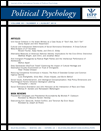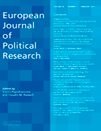I discussed my research on Personality and European Union Attitudes (Bakker & de Vreese 2016) in BBC’s Daily Politics:
Category Archives: Research
Paper accepted for publication: European Union Politics
My paper, co-authored with Claes de Vreese, addressing the association between personality and EU attitudes is accepted for publication in European Union Politics. Click here to read the paper (click here for the Online Appendix and the Repliciation Folder).
Abstract
We still do not fully understand why attitudes towards the European Union (EU) differ among citizens. In this study, we turn to the Big Five personality traits Openness, Conscientiousness, Extraversion, Agreeableness, and Neuroticism as antecedents of EU attitudes. Based on a national survey, we focus on attitudes towards widening and deepening of the EU, trust in EU institutions, identification with the EU, and negative affect experienced towards the EU. The nature of the EU attitude is expected to condition the strength and direction of the association of a particular EU attitude with a personality trait. The Big Five traits are indeed predictors of some but not all EU attitudes and will shape how citizens’ respond to changes in the institutional set-up of the EU.
Paper accepted for publication: Political Psychology
My paper, co-authored with Robert Klemmensen, Asbjørn Sonne Nørgaard, Gijs Schumacher titled: “Stay Loyal or Exit the Party? How Openness to Experience and Extraversion Explain Vote Switching ” was accepted for publication in Political Psychology.
Abstract:
Following Hirschman, voters who are discontent with the party they voted for have two options: exit the party and vote for another or stay loyal. The inclination to exit or stay loyal is rooted in the Five Factor Model (FFM) of personality. We test our argument in two panel studies in Denmark and the United Kingdom (UK). We find that citizens open to experience are more likely to switch parties since they are more likely to think about alternatives and take risks. Extraverts identify and commit themselves to organizations and stay loyal in Denmark, but we do not confirm this pattern in the UK. Our findings demonstrate that electoral volatility is, at least partly, rooted in personality.
Paper published in European Journal of Political Research
Together with David Hopmann (University of Southern Denmark) and Mikael Persson (University of Gothenburg) I publisehd a paper titled: “Personality traits and party identification over time” at the European Jouranl of Politcial Research (Click here to read the paper).
Abstract: Why do some people stably identify with a party while others do not? This study tests whether and how the direction, stability and strength of party identification are associated with big five personality traits, using panel data from a representative sample of German citizens. First, the study confirms that personality traits are related to identification with different political parties. Second, it moves beyond previous research by showing that personality traits are related to the strength and variation in party identification over time. The implications of the study for the classical perspectives on party identification, as well as the personality and politics literature, are discussed



